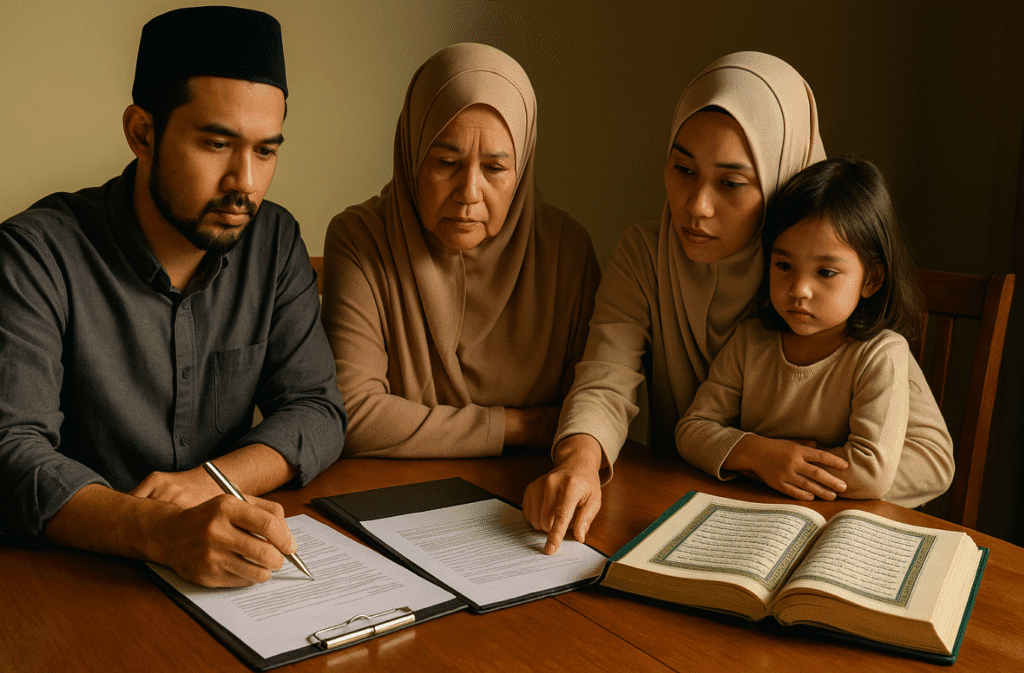A mother’s funeral had just ended. The family sat in the living room, Qur’an recitations still echoing faintly. But instead of peace, tension filled the air. The eldest son raised his voice, insisting he deserved more because he had “looked after her the most.” A daughter clutched her children close, afraid of being sidelined. Another sibling quietly searched online, typing: “inheritance dispute Muslim Singapore.”
This scene might sound like a TV drama, but it is closer to reality than many families admit. Death often exposes unfinished business, especially when there is no clear estate plan. And in Islam, leaving things to chance does not just risk family bonds, it risks disobeying divine law. These are the very estate planning lessons many Muslim families in Singapore need to confront.
The Islamic Foundation of Estate Planning
The Qur’an is remarkably clear about inheritance.
- “Allah commands you regarding your children: to the male, a portion equal to that of two females…” (Surah An-Nisa’ 4:11)
- “They ask you for a ruling. Say, Allah gives you the ruling concerning kalalah (those who leave no direct descendants or parents)…” (Surah An-Nisa’ 4:176)
The Prophet ﷺ also warned: “Give the shares to those who are entitled to them, and whatever remains, it is for the nearest male heir.” (Sahih al-Bukhari, Sahih Muslim)
Estate planning, then, is not just a financial tool. It is an act of worship and justice. It ensures wealth is passed down in line with Faraid, while still allowing some flexibility for charitable bequests or specific gifts — within the one-third limit. These divine rules are themselves estate planning lessons, guiding us to avoid disputes and protect harmony.
Real Case 1: Haji Ibrahim bin Abdul Samad (2004)
The late Haji Ibrahim left behind a wife, three sons and seven daughters. His will dated 1996 included charitable bequests and references to nuzriah (vows). After his death in 1997, some of his children challenged the document.
Court’s decision:
- The bequests to mosques were valid because they fell within the one-third share allowed under Faraid.
- The nuzriah clauses were struck down — unclear, inconsistent with both Islamic law and Singapore statutes.
- Anything that conflicted with Faraid distribution was unenforceable.
Lesson:
A will must stay within Faraid boundaries. Bequests beyond one-third to non-heirs require the consent of all heirs. Otherwise, parts of the will can collapse, leaving families stuck in court.
References: eLitigation judgment, Singapore Legal Advice
Real Case 2: Shafeeg bin Salim Talib v Fatimah bte Abud (2010)
A dispute arose over property held in joint tenancy. Under civil law, joint tenancy means when one owner dies, the survivor takes the whole property automatically. But what about Faraid?
Court’s decision:
- The Court of Appeal ruled survivorship applied. The property passed fully to the surviving joint tenant, not into the deceased’s estate for Faraid distribution.
- Only the deceased’s share, if proven to exist outside survivorship, could be distributed under Islamic law.
Lesson:
Property titles matter. A Muslim may intend for Faraid to apply, but civil law structures like joint tenancy can override that. Without careful planning, heirs may receive less (or nothing) from certain assets.
References: eLitigation judgment, Singapore Legal Advice
Estate Planning Lessons for Families
- Estate planning is both Islamic and practical.
Writing a will, making nominations, and clarifying property titles is part of fulfilling Allah’s command. - Do not wait.
Haji Ibrahim’s case shows that vague vows and unchecked bequests can spark years of disputes. - Understand the law.
Shafeeg’s case proves civil law structures may not align neatly with Faraid. Joint tenancy, CPF nominations, and insurance payouts need careful alignment. - Get expert help.
Estate planning for Muslims in Singapore sits at the crossroads of Shariah and state law. MUIS, Syariah Court, lawyers and certified planners all play a role.
Closing Thoughts
Estate planning is not about mistrust or morbid thoughts. It is about ensuring peace after you are gone. The Qur’an does not leave inheritance to human emotion because Allah knows how fragile we are when grief collides with money.
If you have assets, even modest ones, it is time to speak with an estate planning expert who understands both Faraid and Singapore law. Leaving it unsaid is not humility — it is neglect. These are estate planning lessons that no family should ignore.
Featured Estate Planning Specialist
Professional & Value for Cost Estate Planner has guided Muslim families in Singapore to plan their legacy with confidence. From Faraid distribution to CPF nominations and hibah arrangements, their advice balances Islamic obligations with local legal requirements.
Clients range from young couples starting a family to seniors ensuring their assets are passed down smoothly. Clear processes, transparent costs, and empathy define their service, giving families peace of mind during life’s most critical transitions.
Need clarity on your estate plan
Visit our website
Affordable, professional, and aligned with Islamic values.
More Reads
- A Compassionate Employer: Sunnah Guidance for Treating Maids Well in Singapore
- Why Attar is Making a Stylish Comeback Among Muslims in Singapore



